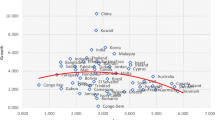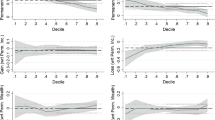Abstract
Commodities do not only serve the purpose of satisfying direct needs in the production and consumption process. Some of them are also used to display social status and to affect the position of an individual in society. The paper looks at status-seeking activities in an economic-growth context. Two questions are asked. Does status-seeking behavior accelerate economic growth? And: should capital accumulation be subsidized to correct for the status externality? The answers to both questions are ambiguous.
Similar content being viewed by others
References
Barro, R. J., and Sala-i-Martin, X. (1995):Economic Growth. New York: McGraw-Hill.
Boskin, M. J., and Sheshinsky, E. (1978): “Optimal Redistributive Taxation when Individual Welfare Depends on Relative Income”.Quarterly Journal of Economics 92: 589–601.
Cole, H. L., Mailath, G. J., and Postlewaite, A. (1992): “Social Norms, Savings Behavior, and Growth”.Journal of Political Economy 100: 1092–1125.
Corneo, G., and Jeanne, O. (1995): “Status Seeking Can Generate Long-Run Growth in the Solow-Cass Model”. SFB 303 Discussion Paper A-497, University of Bonn, Bonn.
Fershtman, C., Kevin, K. M., and Weiss, Y. (1996): “Social Status, Culture, and Economic Growth”.Journal of Political Economy 104: 108–132.
Frank, R. H. (1985a):Choosing the Right Pond: Human Behavior and the Quest for Status. Oxford: Oxford University Press.
— (1985b): “The Demand for Unobservable and Other Nonpositional Goods”.American Economic Review 75: 101–116.
Frank, R. H. (1996): “Cash on the Table: New Wealth for the Taking”. Paper presented at the International Seminar on Public Economics, December 12–14, 1996, Bonn.
Konrad, K. A. (1992): “Wealth Seeking Reconsidered”.Journal of Economic Behavior and Organization 18: 215–227.
Layard, R. (1980): “Human Satisfaction and Public Policy”.Economic Journal 90: 737–750.
Rae, J. (1905):The Sociological Theory of Capital. New York: Macmillan.
Ramsey, F. P. (1928): “A Mathematical Theory of Saving”.Economic Journal 38: 543–559.
Rauscher, M. (1997): “Protestant Ethic, Status Seeking, and Economic Growth”. Thünen Series Working Paper no. 9, University of Rostock, Rostock.
Romer, P. M. (1986): “Increasing Returns and Long-Run Growth”.Journal of Political Economy 94: 1002–1037.
Seidman, L. S. (1987): “Relativity and Efficient Taxation”.Southern Economic Journal 54: 463–474.
Veblen, T. (1899):The Theory of the Leisure Class: an Economic Study of Institutions. London: Allen and Unwin.
Weber, M. (1904): “Die Protestantische Ethik und der ‘Geist’ des Kapitalismus”.Archiv für Sozialwissenschaft und Sozialpolitik 20: 1–54.
Author information
Authors and Affiliations
Rights and permissions
About this article
Cite this article
Rauscher, M. Conspicuous consumption, economic growth, and taxation. Zeitschr. f. Nationalökonomie 66, 35–42 (1997). https://doi.org/10.1007/BF01231466
Received:
Revised:
Issue Date:
DOI: https://doi.org/10.1007/BF01231466




